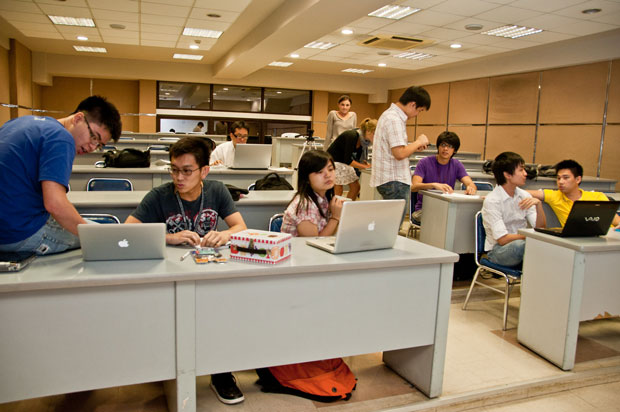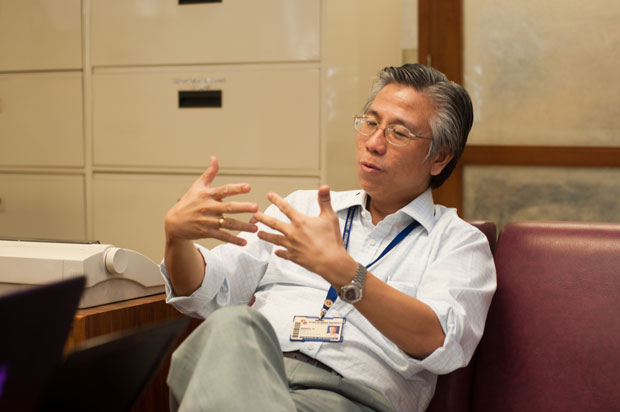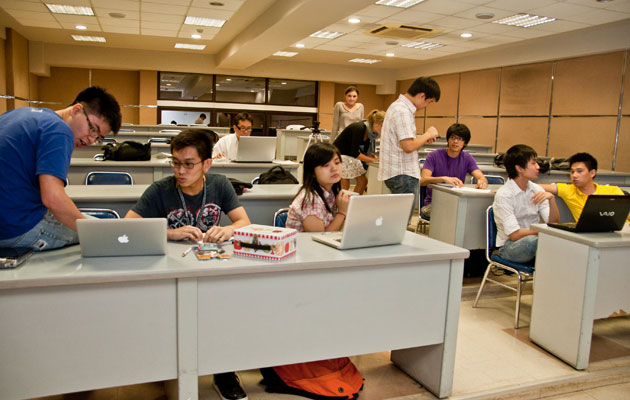
Academic dissonance. Studying accounting and cost minimization on one hand and preferential option for the poor on the other, JGSOM majors face the unique challenge of having to reconcile seemingly conflicting points of view. Photo by Sarah N. Aquino
It’s all about the money.
It’s all about getting ahead of everyone else, of doing everything possible to ensure the maximization of resources. You understand how vital it is that your net benefits outweigh your overall costs. Enterprise success is the end goal—sometimes you’d have no choice but to forget that other people’s lives are also at stake.
At the end of the day, it’s all about the profit.
At least, that’s what some John Gokongwei School of Management (JGSOM) students feel they are being taught in a typical Ateneo business course, as they go through four years’ worth of business classes geared to guarantee their survival in the corporate world.
But one way or another, questions eventually arise in these business students’ minds. What then of ethics, or of social responsibility?
This is an angst that has found its way into the minds of these business majors, as they embark on a career seemingly replete with cold numbers while devoid of ethical considerations.
And so the troubled among them are led to an inevitable question: what is the relevance of all these philosophy and theology classes?
A crisis of dissonance
Unique from the curriculum of other universities, the school’s core curriculum comprises half to at least one-thirds of each student’s Ateneo education. Such a curriculum was designed to uphold the Ignatian tradition of giving students an education infused with holistic formation. After all, the Ateneo aims to develop well-rounded students who excel not only with the skills required for their chosen career paths, but are also imbued with the values that distinguish men and women of character.
At the onset, though, JGSOM students claim that they do not explicitly feel the effectiveness of such an academic integration.
Drew Copuyoc, Sanggunian president and a fifth year management engineering student, identifies the lack of academic integration as a consequence of diverse teachings and perspectives.
“For me, it’s really disconnected. [The subjects] are really handled by different people with different views, and for me there really is a lack of integration,” Copuyoc says. “[Our core subjects] would be much more relevant if [they] would be integrated with our major subjects, because then we could really understand [the core subjects] through the perspective we are being taught in.”
Kenneth Abante, president of the Council of Organizations of the Ateneo and a management engineering senior, narrates his experience and thoughts of having undergone a similar crisis of disillusionment in his early years in college. He had questioned the possibility and capacity of the nature of business itself to be ethical, and whether his course and chosen career path may inevitably lead him to a direction diametrically opposed to a life of helping the less fortunate.
“The work seems heartless,” he says, describing his perception of his major subjects. “There are numbers, but what do they mean?”
According to Abante, it is therefore understandable why more and more JGSOM students have been taking up minors in philosophy (as he did), in their struggle to find more integration, depth and meaning in their chosen fields of concentration.
A matter of perspective
Some professors perceive the students themselves to be the root cause—and, ultimately, the end solution as well—to this feeling of academic dissonance.
Anna Mendiola, Marketing and Law Department chair in JGSOM, says adamantly, “There certainly has been no disconnection in what [the Ateneo] teaches.” She explains further by describing the objectives of an Ateneo business education and how it is constructed precisely to deter such a lack of integration in the curriculum.
“Earning money isn’t bad. It’s what you do with the money once you’ve earned it that matters,” she argues. “There’s only a strong misconception of the manipulative nature of business simply because of its explicit value for money. But business, at least according to the principles of an Ateneo education, shouldn’t exist for money’s sake.”
Mendiola says that when the “potentials of business in developing the rest of society” are considered, it will be clear that a business career path goes hand in hand with what the students learn from their humanities education.
JGSOM Dean Rodolfo Ang addresses the apparent lack in consistency between the Ateneo’s business and ethics courses. He explains that in the context of a diverse student body—plus an equally diverse set of faculty members, there is bound to be a variety of perspectives as well. It is precisely through this situation of diversity that the Ateneo encourages students to think freely and critically about what they are taught, instead of to simply depend on their professors to provide them with everything they ought to know.
Furthermore, he believes that there is an inherent value in the students’ very questioning of possible disconnects or inconsistencies in their lessons.
“If everyone speaks with only one voice… then we are not helping you to be the best that you can be,” Ang explains. “The fact that students are asking these questions—how you can relate philosophy classes to your subjects—this is a success for us already! Because if you were not as good a student as we hoped you were, then you wouldn’t even be asking these questions.”
For Ang, though, the key value in questioning lies in the students’ ability to act upon their realization of such a dissonance.
“At the same time that we are glad they are asking those questions, we’re hoping they will find the answers on their own. [It is] precisely the point of the liberal arts education to make you have critical thinking skills,” he says. “[We hope students will] be able to analyze and come up with alternatives… with decisions… that work for [them].”

Means to an end. Darwin Yu emphasizes that business theories should be taken into account in the proper context when juxtaposed with core subjects. Photo by Migi C. Soriano
“Formation of their humanity”
This is where the significance of the core curriculum for a holistic Atenean formation comes in—reflection and critical analysis is honed in the core curriculum, especially in philosophy and theology. Professors and students alike recognize the core curriculum as the very strength and distinction of an Ateneo education.
For Agustin Rodriguez, Philosophy Department chair, the problem lies in students’ unwillingness to be moved by their core subjects.
Talking more about the students who just choose to ignore any feeling of dissonance, he says, “The disconnection is there because they are closed to learning. They may be discontented [because they] desire for a kind of education that Ateneo doesn’t offer—one that simply gives the skills for the technical stuff but doesn’t bother with the formation of their humanity.”
Pointing out the difference between the Ateneo and vocational schools, Rodriguez explains, “We teach you not only professional or technical skills, but also skills through which you may understand reality and the issues from your discipline in a holistic perspective.”
For his part, coming to the defense of the Ateneo’s business education, Ang points out that the business majors’ “appreciation of what they are getting in school is incomplete now, because they are not yet in the workplace.”
“Over time,” he says, “they will… begin to see the value of their core curriculum, and how this has distinguished them as professionals for others.”
Leadership and Strategy Department Chair Darwin Yu shares the same sentiments. He explains that the strength of the Ateneo’s business education takes root in the university’s ability to teach its students communication and critical thinking skills, as well as its emphasis on the students’ relatability to the larger whole.
He argues, “You can’t be an effective leader if you are not formed as a person. You need to be firm in your thinking and develop strong beliefs about yourself first.”
This relates to Yu’s view of the JGSOM brand of education: “For JGSOM, business is seen as a way of engaging society by looking for gaps and filling those gaps, and that’s how we contribute to the greater good.”
“Students need to figure this out for themselves,” he says. “They need to learn how to think, because when conditions change, it is not simply the technical skills that they need—it is also the theoretical.”
Becoming Atenean
In the final analysis, the problem no longer lies simply in how core and major subjects are being taught. In fact, the diverse academic setting of the university has been invaluable in allowing the students the exercise of free thought.
Such diversity can be seen as deliberate, aimed to challenge students to define their education’s potential for themselves. In the end, what comes out of this free thought—the intent to learn and to respond to these dissonances—is of greater importance.
Fr. Adolfo Nicolas, SJ, Jesuit superior general, had said before: “People lose the ability to engage with reality; that is a process of dehumanization that may be gradual and silent, but very real.” This seems to be the the caveat signaled to current undergraduates, especially those in their final year in the Ateneo. There is a call for Ateneans to move beyond immediate, personal needs and narrow perceptions of social reality in order to become more fully human.
The dissonances do exist; it is indeed difficult to reconcile preferential option for the poor with cost-minimizing contractualization. However, what an Ateneo education imbues in its students is the courage to act upon these dissonances.
As Rodriguez says, the value of an Ateneo education is manifested and affirmed through what the student has become—how more human he has become: “Hindi ka lang businessman—tao ka.
With reports from Elijah V. Pascual







